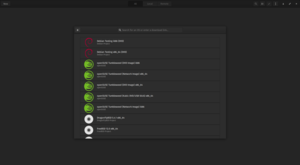GNOME Boxes
 The box creation "Source Selection" screen for Boxes 3.32 | |
| Developer(s) | The GNOME Project |
|---|---|
| Repository | |
| Written in | C, Vala |
| Platform | GNOME |
| License | GNU GPL[1] |
| Website | wiki |
GNOME Boxes is an application of the GNOME Desktop Environment, used to access remote or virtual systems. Boxes uses the QEMU, KVM, and libvirt virtualization technologies.[2]
GNOME Boxes requires the CPU to support some kind of hardware-assisted virtualization (Intel VT-x, for example).
History and functionality
GNOME Boxes was initially introduced as beta software in GNOME 3.3 (development branch for 3.4) as of Dec 2011,[3] and as a preview release in GNOME 3.4.[4] Its primary functions are as a virtual machine manager, remote desktop client (over VNC), and remote filesystem browser, utilizing the libvirt, libvirt-glib, and libosinfo technologies.[5] This enables the viewing of remote systems and virtual machines on other computers in addition to locally created virtual machines. Boxes possesses the ability to easily create local virtual machines from a standard disk image file, such as an ISO image while requiring minimum user input.
People
Boxes was originally developed by Marc-André Lureau, Zeeshan Ali, Alexander Larsson and Christophe Fergeau[6] and is currently being maintained and developed by Felipe Borges.
See also
- VirtualBox
- Red Hat Virtual Machine Manager (virt-manager)
- VMware Workstation
- List of GNOME applications
References
- ^ https://git.gnome.org/browse/gnome-boxes/tree/COPYING
- ^ "What is the technology used by Boxes?". GNOME Help. The GNOME Project. Retrieved 2017-07-06.
- ^ "GNOME developers create Boxes for virtualisation". The H. November 23, 2011.
- ^ "A Second Release Of GNOME Boxes Is Boxed Up". Michael Larabel. Phoronix. December 21, 2011.
- ^ "Boxes on GNOME wiki! GNOME 3.3.x Development Series". Retrieved September 30, 2012.
- ^ "Boxes on GNOME wiki!". Retrieved September 30, 2012.
